I hear from parents all the time, “Help, my child won’t brush her teeth!” Discover why and get 9 powerful tips to help your child move past the refusals, battles, and tantrums quick. Affiliate links used below.
It’s a non-negotiable.
It doesn’t matter how much your kid doesn’t like it.
They’ve got to do it.
Or, they’ll end up with dirty teeth filled with cavities in no time flat. You know that, and so you have the daily battle to get their teeth cleaned. But, that doesn’t make it any easier when they hate getting their teeth brushed.
Not only have I been there as a parent, as an occupational therapist, I’ve had a lot of families I’ve worked with (and my students) desperately tell me, “My child won’t brush her teeth!”
When a child doesn’t like to brush their teeth, it can turn into a daily battle that you both end up dreading.
But, I’ve got 9 different tips that can help your child learn to tolerate and maybe even enjoy this necessary daily activity. Before we get to them though, it’s really important that you’ve got a handle on why you’re child is refusing to brush their teeth…
Why Does Your Child Refuse to Brush Their Teeth?
As a parent, I’m always a little taken back when my child doesn’t do what they’re supposed to. Although I hate to admit it, my first response is usually feeling annoyed at the inconvenience.
My kids have given me plenty of opportunities to feel this from when my baby wouldn’t eat to my first grader refusing to get on the bus.
Brushing their teeth is no exception. Two out of three of my kids went through a phase as toddlers when they would scream, run away from me, and then throw themselves on the ground as soon as I picked up the toothbrush.
Another one of those, “Why are you doing this to me” moments!
But, the truth is that there’s a reason they don’t like it.
My Child Won’t Brush Her Teeth… Because She’s a Toddler?
The first reason to consider why your child may not be brushing their teeth is if they are a toddler. It could be as simple as that. Toddlers want to keep moving and having to stand still while you brush their teeth for 2 minutes can seem like an eternity in a toddler’s mind.
If you’ve got a 1-3 year old, know this is probably part of the reason they hate getting their teeth brushed. Tips #2, #3, and #7 will be key in helping them accept brushing their teeth.
My Child Won’t Brush His Teeth… Because It Hurts or Feels Weird?
For older kids, and some toddlers, they’re refusing to brush their teeth because of how brushing their teeth feels. If your child is sensitive to sensations, tooth brushing can feel painful, uncomfortable, or even tickle.
This is hard for us to relate to because we brush our teeth everyday and it’s never painful.
But, kids haven’t had the long term exposure to it that we have. They aren’t desensitized to vigorous brushing.
Plus, this sensitivity is commonly associated with sensory issues or needs in kids. That doesn’t mean they need any sort of diagnosis, but it could mean that they’re experiencing sensations differently than most other kids.
It’s critical to be aware of and supportive of that difference.
If you aren’t sure if your child doesn’t like the feeling of brushing teeth, then ask them why they don’t like to brush their teeth. Make sure you ask at a time away from regular tooth brushing when emotions aren’t running high.
They might surprise you. Their response can give you a lot of insight.
If you know this is the reason your child hates brushing their teeth, than it can be improved. They can become desensitized, but it will take some time.
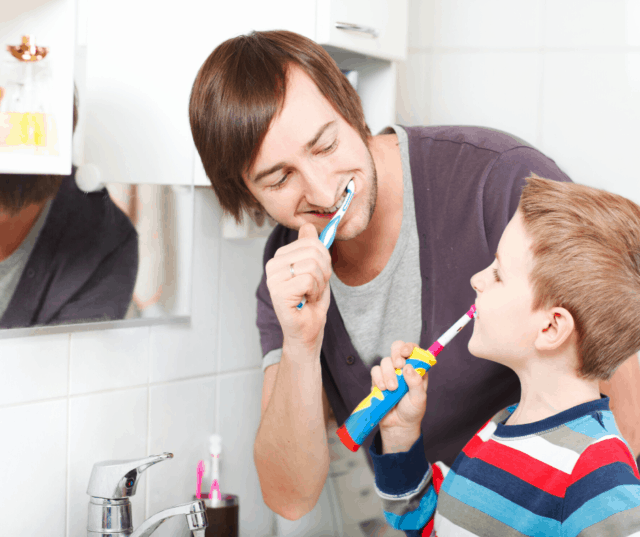
My Child Won’t Brush Her Teeth… Because of the Taste?
They also may not like the taste of the toothpaste, which is why it’s always a good idea to ask if they’d like to try another flavor. Then, let them pick out the type they think they’d like.
Even if taste doesn’t have a lot to do with it, asking them gives them a sense of control which will only help the situation
I did ask my kids.
I wanted to use a natural toothpaste, and had researched the Dr. Brite brand (they’re amazing). One picked Mint Chocolate Chip, while my other two kids picked Strawberry.
When the toothpaste came, they were excited about the flavors and have been using them for over a year now.
Disliking Tooth Brushing Can Be Linked to Picky Eating
One last thing before we jump into these 9 tips. When your child is really sensitive to the feeling of the toothbrush, it’s common for them to also be sensitive to other textures in their mouth.
That means they might not like other textures of food, and be picky eaters.
If you see this link with your child, head to Sensory Issues with Food for more idea to help with their eating too!
Affiliate links used below. See our full disclosure.
9 Ways to Get Kids to Brush Their Teeth
I’ve got a bunch of tips to help you get your kid’s teeth brushed without a battle. You don’t need to use them all, but pin this so you can keep referring back to these tips as you need them.
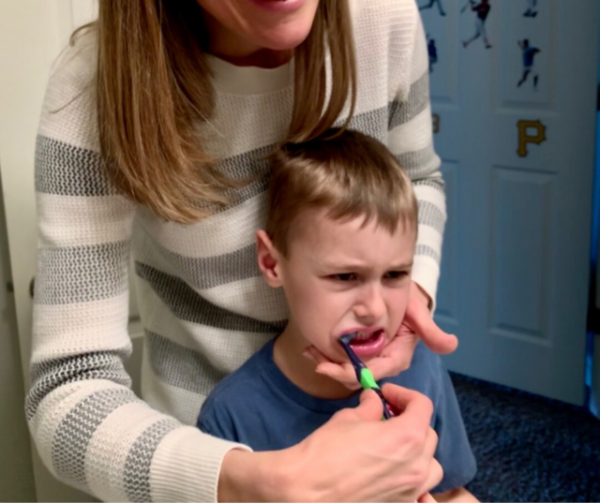
1. Stand behind them: This might sound strange, but you can wrangle your child better if you stand behind and lean around them to brush their teeth. More importantly, it gives kids a sense of security when they can lean back into you if the sensations of tooth brushing cause them irritation.
2. Sing: Pick a simple nursery rhyme to use every time you brush your child’s teeth.
It could be “The Itsy Bitsy Spider” or “I’m a Little Teapot” song. It doesn’t matter as long as it isn’t too long. The first couple times you sing it won’t help much, but as you consistently sing the song every time your child brushes their teeth, they’ll begin to learn how much longer they have to endure the tooth brushing. When the song ends, so does getting their teeth getting brushed.
For older kids, you can use toothbrushes with timers built into them. Or, a sand timer like this one on Amazon that you sit on the bathroom sink for them to watch.
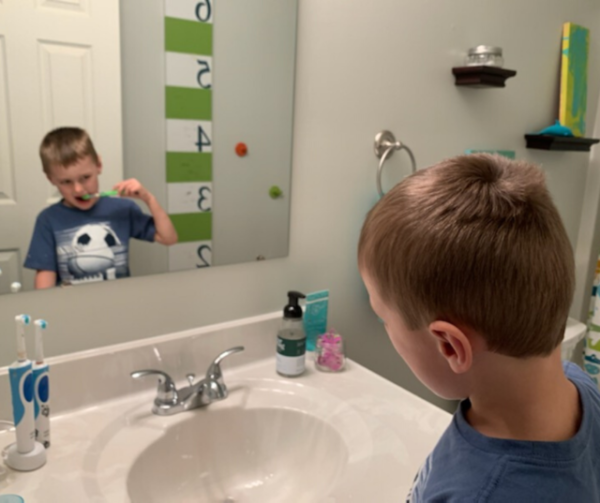
3. Stand in front of the mirror: Position your child in front of the mirror when you brush their teeth. Grab a step stool if you need to! When your child can see what you’re doing, instead of blindly feeling the sensations, it can help them tolerate getting their teeth brushed.
I even like to say things like, “Oh look, we’re getting the back teeth now.” If I’m not using the singing strategy (see above) that is.
4. Modeling: While most dentists recommend parents brushing their kids teeth until at least age 6 (some recommendations say age 9-10), giving kids the wheel can be helpful way to begin tooth brushing. They’re in control, which toddlers love. And, for the kids with sensitivities, they can tolerate the sensations better.
Just make sure you brush their teeth well after they’ve “practiced”.
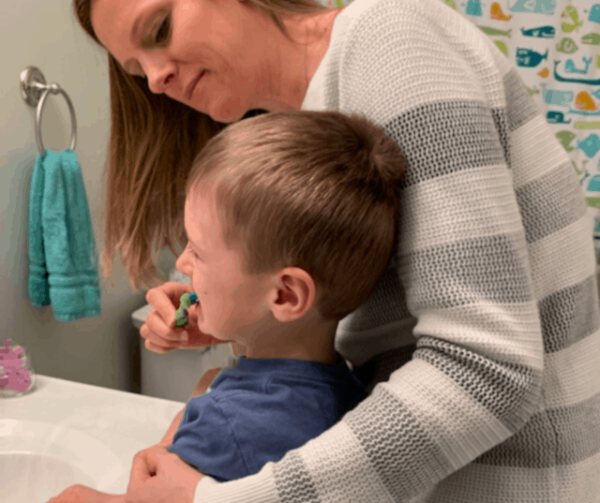
5. Give Firm Pressure: An additional way to help kids that are sensitive to the sensations of tooth brushing is to use the hand you’re not brushing their teeth with to push down firmly on their shoulder. Or, to firmly hold their chin. This is called deep pressure and can ground and calm kids with sensory sensitivities.
*If your child is brushing their teeth themselves, you can stand behind them and use both of your hands to push down on their shoulders (if they like that).
6. Hold a toy: Holding a toy, particularity a stuffed animal you can squeeze, will also give your child some calming deep pressure and tactile sensations. This can also become part of your routine. They could even have a special tooth brushing stuffed animal that stays under the bathroom sink!
7. Make a routine: Speaking of making routines, you’ll want to create a simple one, that may incorporate some of these tips. Here’s an example of a tooth brushing routine:
-
-
- Brush teeth every night after bath and before reading stories
- Remind your child that you’re going to brush teeth 10 min, 5 min, and 1 min before you begin (this is tip #8)
- Give them their stuffed animal to hold and guide them to the sink where they can see themself in the mirror (tip #6)
- Stand behind them with one hand on their shoulder for deep pressure while you sing “Mary had a Little Lamb” (tip #8)
-
Your routine doesn’t have to look exactly like this one.
Make it to suit you and your child’s needs. But, be consistent. When your child knows what to expect, they’ll be much more compliant.
For children that aren’t verbal or have special needs, a visual schedule can help them understand the steps in the routine.
8. Give Warnings: Many kids get frustrated and refuse to comply with tooth brushing because they don’t feel like it.
They’re in the middle of playing and don’t want to drop what they’re doing. Remember, they don’t have an understanding of time the way we do. They don’t understand, it’s almost bed time and they have to brush their teeth now or it will get too late and they’ll be overly tired and miserable the next day.
Giving some simple warnings ahead of time can help kids transition away from what their doing more easily. It also helps them mentally prepare for a task they may not like!
Depending on their age, and how much they hate tooth brushing, will dictate how many reminders they need. 1-3 warnings is good for the vast majority of kids.
9. Use Sensory Activities Before Hand: If your child has a hard time standing still for tooth brushing or is really sensitive, you might want to experiment with doing some sensory activities before you even try to brush their teeth. Anywhere from 10-30 minutes before tooth brushing, you can try letting them get their energy out by jumping on a trampoline or running around in the backyard.
This concept is called a Sensory Diet. It’s preparing the body for tooth brushing so they can tolerate it more easily. The activities you can use for a sensory diet vary widely, depending on what helps your child calm down. Head to 100+ Sensory Diet Activities to get more ideas.
You’ve got 9 tips you can use today! I want to hear from you in the comments (we read and respond to every single one). Tell me what tip you’re most excited to try and if you’ve got any tips you use, then please share them with us!!!
More Help for When Kids Refuse Necessary Daily Activities
Here’s a Method to Help Kids That Hate Hair Washing
Real Help for Kids Sensitive to Noises with 5 Easy Steps!
How to Cut Your Kid’s Nails Without Any Tears, Tantrums, or Freak Outs!
Alisha Grogan is a licensed occupational therapist and founder of Your Kid’s Table. She has over 15 years experience with expertise in sensory processing and feeding development in babies, toddlers, and children. Alisha also has 3 boys of her own at home. Learn more about her here.
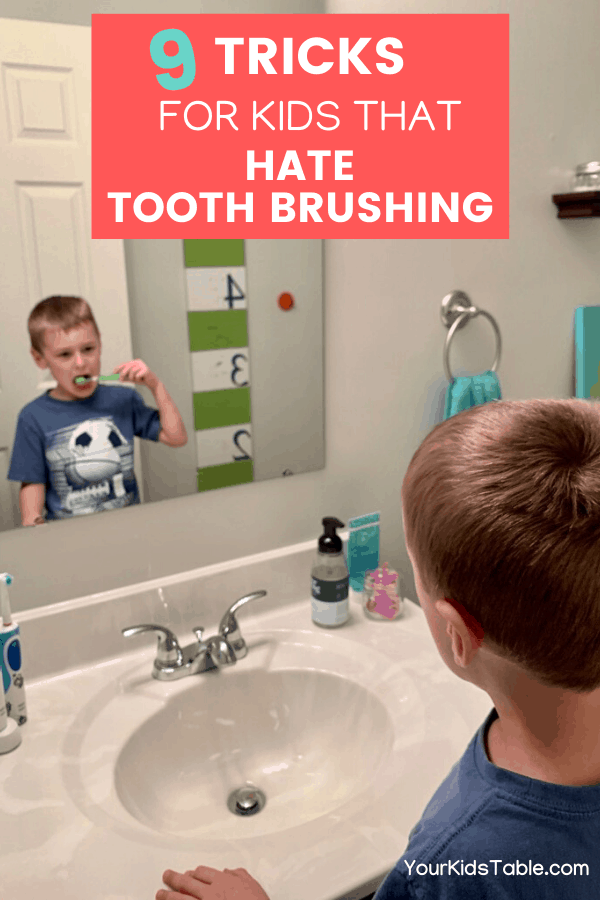
All these suggestions are very good.
My suggestion is to show them some pictures of children, with rotten teeth, that are posted on the internet.
My grandson, who is 18, and heading off to college, brought the subject up the other day, for some reason. He said, those pictures I showed him, when he was little and spent the night, “Scared him straight”
Oh, let me add, he has perfect teeth.
Great tips! I especially love the idea of making it a fun game. My daughter has been so resistant to brushing her teeth, but I think she’d enjoy a little competition. Thanks for the encouragement!
I had the same problem with my kids. They hated brushing their teeth, so I came up with a story about a boy who wouldn’t brush his teeth until he met a pirate called Black Tooth Bob and that once he saw the pirate’s teeth and the smell from his breath, he started brushing. Anyway, it worked. They loved the story, and it took their mind off the brushing. So successful was it that beginning of November (2023) I will publish the book on Amazon. It’s a rhyming picture book called “Toothbrush Tantrum” by Mark Powell. Look it up when it comes out. It may help with getting them to brush their teeth. 😃
I have a child who won’t brush her teeth. I’ve tried everything and I’m at my wits end. I’ve tried bribery, threats, and even force. What can I do to get her to brush her teeth?
See my comment above 🙂 it works. I read the book and showed the pics as they brushed their teeth and Black tooth bob became the reminder word when they fell back into their old ways lol.
Hello there,
What is the age of the child? It sounds like things have become a battle and there’s likely more going on. I’m guessing you’ve tried a range of toothbrushes including electric, etc? I would work on the general desensitization of the mouth with some oral sensory strategies here.
Best,
Laura
Your Kid’s table team member
What about using a finger cot? I’ve switched from using a tooth brush to those and they seem to be tolerated much better!
Hi Gerri! Thanks for reaching out! In regards to using a finger cot as a toothbrush alternative, I would think it might be okay in combination with toothpaste, however it would be best to ask your child’s dentist! They would be able to give you the best information and opinion in terms of effectiveness of using something like a finger cot 🙂
Best,
Kalyn
Hello,
My 3 year old has always hated brushing his teeth. It is a nightmare. He will cry hysterically and I feel I have tried everything. I don’t know what else to do. I’ve tried with no toothpaste, a little toothpaste, a different brand, different toothbrushes and it’s the same. He will cover his mouth so I can’t brush his teeth. It’s gotten to the point where I have to pry his arms away from his mouth to get a ten second brush in. Absolutely lost on what to do, my eldest was never like this! 🙁
Hi Nadine! So sorry to hear about your struggles with brushing teeth- it can be so stressful! Definitely try the 9 tips mentioned in the post. Aside from that, it also might help to get to the root of the issue, which is probably sensory related. We have a free sensory workshop that can help with this! Save your seat here!
Best,
Kalyn
My 9 year old has had issues with his teeth since he was 3. He fell on our marble floor and busted his 2 front teeth and had to have surgery to remove them and heal. He also has an issue with texture, smell and taste and absolutely hates the smell of toothpaste. I’ve only ever been able to brush his teeth with water and sometimes baking soda so needless to say, he has had 4 surgery’s and the last one lasted 7 hours to fix all the damage to his teeth from not brushing. After the surgery last year, his gingivitis has healed and his teeth were capped to protect them. He now has new teeth and his caps are yellow with bleeding gums and I’m at a loss as to what to do. We spend over an hour at night begging him to brush with either fluoride rinse or watermelon flavored tooth paste but he still won’t. I feel as if this is now causing psychological issues. I cannot stand begging my child until he cries every night and still not brushing his teeth. We contacted a counselor and she does not seem to think he needs further sessions but I just know that his next dentist appointment, they are going to say bye bye to us and say “if your not gonna take care of your teeth, then we are not going to keep fixing all the self inflicted issues” !! I don’t know what to do because I feel like I’m torturing my child every single night. He knows he needs to brush to teeth but when the paste is on the brush, he just can’t let me do it. A dentist once told me that, we have so many muscles in our lips and if someone doesn’t want you in their mouth, you won’t get in. I can’t force him and I’m not going to discipline him anymore but I need help !!!!
Hey Debbie,
Oh my goodness, I’m so sorry to hear about all the struggles you guys have had in the past! That sounds like it’s been really challenging. The article has some great suggestions, since he’s 9 now, I’d definitely encourage him to brush his own teeth. Since he is currently just tolerating water on the brush, I’d start with that. You’ll want to brush your own teeth right at the same time. Every little effort counts at first- so if he can only handle brushing the front for a few seconds at first, that’s ok…it’s just a starting point! As time goes on, if he can’t handle the toothpaste still, dipping the toothbrush into a mouth wash, is another gradual option. Take it slow! Hang in there!
Best,
Andrea
My daughter is 8 & I’ve always had a very hard time morning & nite brushing since about 3 years old.
She will not even let me watch her brush her teeth for the past year atleast never mind brush them for her!! She wipes the toothpaste off on a cloth and then barely brushes for 15 seconds! I tell her she needs to do 2 minutes. We set a timer & she never makes it. I’ve yelled I’ve cried I’ve begged, etc.! She’s using an electric toothbrush @ the moment, but I’ve tried other kinds with no avail.!! Tried different flavors, songs, timers, etc!!!!!!
She’s already had oral surgery 2x !!! Not fun! I’ve talked to her about it til I’m blue in the face.
She did have sensory issues when she was younger & may still have but that’s why I’ve tried all kinds of toothbrushes/paste.
I’m @ my wits end!! HELP!!!!!
My daughter is the same. She is turning 9. She is highly sensitive and toothbrushing is one of those things that her sensitivity really gets triggered. We have tried all of the things… singing, brushing with her at the same time, brushing for her, doing meditation beforehand, rewards, etc. And when she has a loose tooth, it’s even worse. I am at a total loss. The dentist had to manually remove her baby front teeth because she refused to wiggle them and the gums started to grow over them. I am beginning to think we need to do something like hypnosis.
Hi Jen! Maybe some oral motor exercises can help desensitize the sensitivities she has? Also, our free sensory workshop may help with getting to the root of the issue. Check it out and let us know if you have any questions!
Best,
Kalyn
OH!!
And besides all that,
She barely touches the toothbrush to her teeth. And I know she’s not getting each tooth!
She hides behind a towel & I’ve caught her just standing with the toothbrush not even in her mouth when it’s on! 🙄🙄🙄☹️☹️☹️
Hey Stephanie,
It can be really challenging, especially at this age when they’re still refusing. Doing a sensory activity before hand (something calming like heavy work or proprioceptive input) can be extremely helpful. I’d also suggest that you brush your own teeth right along with her. Letting her sit in a comfy spot while doing it, might be helpful.. but I’d avoid letting her hide behind a towel. Our free sensory workshop is a great option to help you with some ideas of activities to do before hand. You can save your seat HERE.
Best,
Andrea
My almost 20 month old son refuses to let me be in control of the toothbrush. He’s been this way since we first introduced the toothbrush around 12 months. We have a routine and he gets excited when we say “it’s time to brush your teeth”, but he aggressively takes the toothbrush from our hands and bites on the bristles, only to suck on the toothpaste. Once the flavor is gone he says he’s done and hands it back. We’ve tried using multiple toothbrushes at once so he could hold one while we hold the other, floss picks, toys, holding him in our laps, laying down, etc. Nothing works. He often gets food stuck in his bottom teeth and I have to hold his arms down in order to barely floss it out. My mom is a dentist and can’t even get him to let her brush his teeth. I’m worried about cavities at an early age. Any other tips? Thanks!
Hey Danielle,
It can be hard, we get it! I would try utilizing a mirror to be silly in so he can see what you are doing, or utilizing filters on your phone to make it fun (but only when allowing you to do it) and he can have a turn after. Also, with him biting down you may want to provide him with something else that he can bite on prior to teeth brushing as he may be seeking that input in his mouth. Something like a chewy tube might be helpful!
Best,
Desiree
Am I the only one that’s straddling my 3 year old and brushing his teeth. Same story of a 3 year boy who runs away at the sight of a toothbrush. I give him 2 choices. Gentle dad or angry dad. 90% angry dad wins and I straddle him so he can’t move and brush away. He puked a couple of times and I feel like crap. I feel like crap having to do angry dad but nothing seems to work. He had 5 big cavities and we don’t need another one. Help. I feel miserable.
Oh that sounds so challenging, especially since he’s had cavities in the past! You’re not alone. We hear from so many families who have this same challenge. Trying an electric toothbrush and letting him take control (while you stand next to him an brush your own teeth) might be a helpful place to start. It can sometimes take a while for kids to get used to the new routine, but letting him do it will help him feel more in control and be more consistent in the long run.
Best,
Andrea
My 1yr old girl has been refusing to brush for about 4 months now. It’s a real mission and she wins every time. I think these are really useful tips but my problem is this – my girl gets really excited, enthusiastic and keen when I mention let’s brush our teeth. She comes along with me too. But the moment she knows the brush has to go into her mouth she starts wriggling about and refuses and cries. This is where I don’t know what to do. Please could you suggest what this could mean?
Hey Thanks for reaching out! Have you tried having her be in control of the brush and making it fun for her? Does she have any difficulties with eating food/putting food in her mouth. A fun trick we like to use is utilizing filters on your phone so she can see herself on the phone while brushing. These may help. If she has difficulty with other items going into her mouth she may have some other sensitivities going on! Hope that helps!
Best,
Desiree
My almost 4 year old, screams Nooooooo whenever we mention brushing his teeth, we have literally tried everything, we’ve been out to buy a brush snd toothpaste he likes the look of, we’ve played games, held toys, all brushed our teeth at the same time, given him treats and stickers when he does, he used to let us do them just fine and now he flat out refuses and it is breaking my heart, it turns into an hour battle every single night. I can’t cope with it anymore. Please help. The tips you e offered are all fine if the child lets you near them with a brush, our boy covers his mouth and shakes his head. Help please!!!!
Hi Rosie,
Brushing teeth can be really stressful for so many families! You might give your 4 year old control of the tooth brush for a bit and resist the urge to check his teeth afterwards (for at least a little while). You can set up a mirror and brush your own teeth right along with him. It can sometimes take a little while to reduce the battles! We also have a post about oral aversion, that might be helpful too.
Best,
Andrea
My 3 yr old actually does well when I brush her teeth, however she still can’t spit out the excess and she swallows it. I am trying to teach her to spit it out, she’s just not getting that part yet. It’s so cute, she makes the noise but only after she swallows the toothpaste. After I brush her teeth, she then wants to do it herself so I let her, and I then brush mine along with her so she can see how I’m moving the brush around and spitting the toothpaste out. So we are slowly getting there. I love reading your articles and tips. They have really helped! 🙂
Hey Angel!
Thanks so much for reaching out, we love hearing that you are enjoying our articles. Spitting can take a little to get the hang of, but sounds like you are on the right track! Keep up the great work!
Best,
Desiree
My four year old likes to “teach” a stuffed animal or doll how to brush teeth. It’s a bit exhausting, but better than fighting about it. We pick a toy to teach, and she asks them what they brush their teeth with (I have to come up with the silly answer – hay, shoes, books, etc). Then she shows them the toothbrush, we put toothpaste on, and she has her turn to brush, then it’s my turn. We make sure to tell the toy “and that’s how you brush your teeth!” at the end. (I don’t especially enjoy this whole process as I think it takes way too long, but it does work.)
Kristen,
I LOVE this tip and such a creative idea!! Thanks for sharing with us!
Best,
Desiree
Great ideas! We’ve done many of these. One to add is mouthwash. I don’t know why but two of my kids with issues brushing teeth are much more willing to do mouthwash. We’ve incorporated it after brushing to compensate when I know we just aren’t brushing well enough. I’ve also been known to accept mouth wash instead of brushing on occasion. My 9-year-old who is on autism spectrum and has major sensory issues hasn’t had a cavity in the 2 years we’ve added mouthwash to our routine and she had them frequently before. She likes a bubblegum flavored mouthwash with flouride. Also, apples are known as nature’s toothbrush. When teethbrushing is a battle, I try to really focus on carrot sticks and apples after meals to get some natural tooth brushing in the mix.
Hey Megan,
Thanks so much for sharing! These are great ideas!
Best,
Desiree